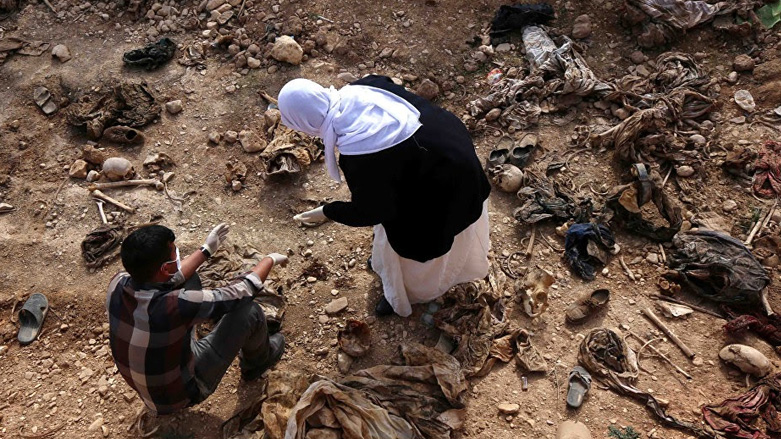Under UN supervision, first Ezidi mass grave to be excavated on March 14: Source

ERBIL (Kurdistan 24) – The first mass grave belonging to Yezidis (Ezidis) is expected to be unearthed on March 14 under the supervision of the United Nations, an Ezidi official said on Tuesday.
The mass grave is located in the Ezidi village of Kojo in the Nineveh province, south of Sinjar (Shingal) town, the Ezidi official told Kurdistan 24 on condition of anonymity.
The emergence of the Islamic State and its violent assault on Shingal in 2014 led to the displacement of hundreds of thousands of members of the Ezidi religious minority, who the extremist group considered were heretics. Most of them fled to the Kurdistan Region, while others resettled in neighboring countries in the region or Western states.
Others were not as lucky and remained stranded in the war zone, where they experienced atrocities and mass executions at the hands of the Islamic State for years. Militants subjected women and girls to sexual slavery, kidnapped children, forced religious conversions, executed scores of men, and abused, sold, and trafficked women across areas they controlled in Iraq and Syria.
Before the 2014 attack, there were roughly 550,000 Ezidis in the Kurdistan Region and Iraq. As the terrorist group took over large swaths of territory in Nineveh, 360,000 Ezidis escaped and found refuge elsewhere, according to the Kurdistan Region’s Ezidi Rescue Office.
So far, 69 mass graves which contain the remains of Ezidis have been discovered, along with untold numbers of individual graves.
As of now, over 3,300 Ezidis have been rescued from an estimated total of 6,417 kidnapped people, according to the rescue office.
Jaafar Simo, the Director of Ezidi Affairs in Duhok, said the excavation of mass graves have been subject to political tensions in the country. Simo said he hoped the graves would be unearthed precisely and protected under the supervision of an international committee.
“Ezidis are very concerned that despite the liberation of Shingal in 2015, the mass graves remain untouched,” he told Kurdistan 24. “It is a social issue, but yet it has been mixed with political tensions in the country.”
He mentioned that Ezidis currently living in camps in the Kurdistan Region cannot stop thinking about the mass graves of their families and relatives and can no longer bear patience.
Over the past few years, the Kurdistan Regional Government (KRG) formed a special committee to collect documents and information about the mass graves and genocide of Ezidis.
“Our committee has already finished the first stage which is collecting all the necessary documents and evidence about those mass graves. We are ready to start unearthing the mass graves whenever we are asked to do so,” Ayman Mustafa, the head of the committee, told Kurdistan 24 on Tuesday.
In 2015, the UN High Commissioner for Human Rights recognized the genocide the Islamic State committed against the religious minority.
Editing by Karzan Sulaivany
(Additional reporting by Masoud Mohammed)
